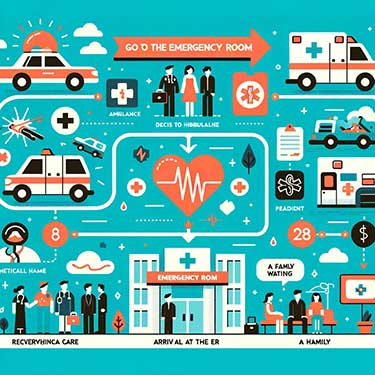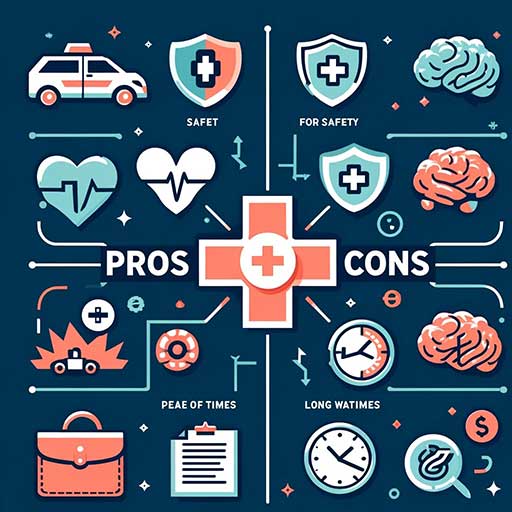
Wondering if heading to the ER is your only option after a car accident? It’s common to find yourself in the emergency room where you might get X-rays (or might not) and then be sent home with some prescriptions and a recommendation to follow up with your primary care doctor.
Furthermore, if your injuries are more along the lines of soft tissue damage, you might question how beneficial that ER visit was. True, it proves you were injured enough to seek immediate care, but car accident injuries often require specialized attention beyond what the ER provides.
The main role of the ER is to save lives and address immediate, life-threatening situations. It’s not uncommon for people to treat the ER as a go-to for all medical care. However, when it comes to car accidents, it’s crucial to see a doctor who specializes in handling personal injuries. This specialized care can ensure you get the right treatment and support for a full recovery.
When to Visit the ER After an Accident
Not feeling hurt right after an accident doesn’t always mean your injury-free. Sometimes, the signs of injuries, particularly internal ones, can take hours or even days to appear. If you’re unsure or start feeling worse as time goes by, heading to the emergency room (ER) is a wise move. Besides getting the care you need; this visit can also provide essential documentation for any insurance or legal steps you might need to take later.
Key Reasons to go to the ER:
- Severe or Uncontrolled Bleeding: If direct pressure doesn’t stop the bleeding, it’s time for ER care.
- Impaired Consciousness: A loss of consciousness, even briefly, or confusion about what’s happening means you need immediate attention.
- Breathing Difficulties: Difficulty breathing after an accident could lead to serious issues inside your body.
- Visible Serious Injuries: Deep cuts, visible bone fractures, or burns are clear signals to go to the ER.
- Chest Pain: Any chest pain or pressure could indicate a heart problem or internal injury.
- Abdominal Pain: Severe pain in your abdomen might be a sign of internal bleeding or organ damage.
- Numbness or Weakness: These could be warning signs of a spinal cord injury or a stroke.
- Severe Headache or Vision Changes: These symptoms can mean a concussion or a more severe brain injury.
Your health and safety are paramount. When in doubt, always choose caution and visit the ER.
Benefits of Visiting the Emergency Room After an Accident

The emergency room (ER) is your go-to for urgent and critical care. Equipped with state-of-the-art technology and staffed by medical professionals who have the knowledge at handling severe injuries, the ER offers swift and thorough evaluations. Whether it’s severe injuries, potential internal damage, or conditions that don’t immediately show symptoms like internal bleeding or concussions, the ER provides the care you need without delay.
Lifesaving Immediate Care
In situations involving head trauma, intense bleeding, or significant chest pain, the ER is indispensable. It’s set up for rapid response, ensuring that life-threatening conditions are addressed promptly, potentially saving lives.
Access to Comprehensive Medical Services
Emergency rooms are not just about handling emergencies—they’re equipped with advanced diagnostic tools and have a skilled team ready to perform a wide array of tests, from X-rays to CT scans. This capability is crucial for diagnosing conditions that aren’t immediately visible, ensuring patients receive comprehensive care tailored to their needs.
Insurance Compliance
Many insurance policies have stipulations requiring medical attention within a certain period after an incident, sometimes as short as 14 days. Visiting the ER can help ensure you meet these conditions, avoiding potential issues with insurance coverage.
Direct Access to Specialists
Should your condition require specialized attention, the ER is a direct gateway to a network of specialists. This ensures you receive the most appropriate and immediate care, whether you need surgery, neurology, or any other specialized medical field.
Critical Documentation for Future Claims
The documentation you receive from an ER visit can be invaluable for insurance claims or legal matters related to your accident. It provides an official record of your injuries and the care you received, which can support your case.
Peace of Mind
Perhaps one of the most significant benefits of going to the ER, even if you feel alright, is the peace of mind it offers. Getting checked out after an accident can confirm you’re either injury-free or that you’re getting the necessary treatment, allowing you to focus on your recovery without worrying about undiagnosed injuries.
Additional Considerations
While the ER provides critical services, it’s important to use discretion. For minor injuries or concerns that don’t require immediate life-saving intervention, other healthcare options like urgent care centers or your primary healthcare provider might be more appropriate. This not only ensures ER resources are available for those in dire need but also can help manage healthcare costs and reduce wait times for you.
Remember, after an accident, prioritizing your health and safety by choosing the right level of care is paramount. The ER stands ready to provide comprehensive, urgent care when you need it most.
Understanding the Drawbacks of Emergency Room Visits
Cost Considerations
Emergency Room (ER) visits are known for their high costs, especially when compared to accident clinics. This is particularly relevant for minor injuries that could be more cost-effectively treated elsewhere. The financial impact can be significant on a personal injury case. Before heading to the ER for minor issues, consider whether an accident doctor clinic could provide the necessary care at a lower cost.
Longer Wait Times
ERs prioritize care based on the severity of conditions, meaning non-urgent cases may encounter substantial wait times. During busy periods, these waits can be lengthy, as emergency departments focus on life-threatening situations first. For quicker attention for non-severe injuries, accident clinics are often a faster alternative.
Quality of Care for Critical vs. Minor Conditions
While accident clinics are well-equipped to handle a variety of injuries, ERs are staffed by physicians with extensive experience in managing critical conditions. However, for minor injuries or conditions, the high level of ER care may not be necessary, and the environment can feel overwhelming.
The Risk of Over testing
ERs are thorough in their approach, sometimes leading to a wide array of tests to rule out serious conditions. While this can be essential for critical injuries, it may result in unnecessary procedures and higher bills for less severe issues.
Exposure to Illnesses
Visiting the ER, particularly during flu season or periods of infectious disease outbreaks, increases the risk of exposure to other illnesses. This is an important consideration for those with compromised immune systems or who are otherwise vulnerable.
Navigating Your Health Care Decisions
When in doubt about the severity of your injuries, it’s always better to err on the side of caution and prioritize your health. If you’re experiencing significant discomfort or symptoms, especially in sensitive areas like the head, neck, or back, seeking emergency care is prudent. However, for minor issues, take a moment to assess your situation. If immediate, life-saving care isn’t necessary, an accident clinic or a call to your accident doctor might be the better choice.
Listening to Your Body
Some injuries may not show symptoms right away. Pay close attention to how you feel in the days following an incident. If something doesn’t seem right, or if symptoms develop or worsen, see a accident doctor immediately. Your health is paramount, and caution is key in ensuring your well-being.
Choosing the right level of care after an injury or accident can make all the difference in your recovery. Whether it’s the ER, accident clinic, or an accident doctor, the important thing is to make informed decisions based on the severity of your condition and the care you require.
Personal Injury Protection and Emergency Rooms
What is Personal Injury Protection (PIP)?
In the world of auto insurance, Personal Injury Protection (PIP), also known as “no-fault” insurance. Available in certain states, PIP coverage is designed to take care of medical expenses, and sometimes even lost wages and other damages, no matter who’s at fault in a car accident. Some states make carrying PIP insurance mandatory, adding it as a component of your auto insurance policy.
How Does PIP Influence Hospital Charges?
You might wonder if being in a PIP state affects how much hospitals charge for their services. While PIP doesn’t directly set hospital rates, it does make it an easier option to the billing and payment process:
- Direct Billing: Hospitals in PIP states often bill your auto insurance provider directly for medical expenses related to car accidents, up to your PIP coverage limit. This streamlined process means quicker compensation for healthcare providers and less billing hassle for you.
- Cost Coverage: With PIP, your insurance covers medical costs regardless of who caused the accident, which might lead to a misconception that hospitals can charge more. However, insurance companies usually have agreements in place with healthcare providers to keep charges within reasonable limits.
- Limits and Deductibles: The specifics of your PIP policy, including your coverage limits and any deductibles, play a significant role in how much of your care is covered directly by PIP insurance. Once those limits are reached, you might need to pay out of pocket or treat under an attorney lien.
Staying Informed
Understanding PIP insurance and its impact on medical billing in your state not only helps you make informed decisions about your coverage but also prepares you for a smoother experience should you ever need to use it. Stay informed, ask questions, and know that PIP insurance is there to support you on the road to recovery after an accident.
Knowing When the ER Isn’t the Right Choice After a Car Accident
Car accidents are scary, and the aftermath can leave you wondering whether to rush to the Emergency Room (ER). However, not all accident-related injuries require the high-level emergency services an ER provides.
- For Minor Injuries: Think small cuts, light bruises, or mild sprains. If these are your main concerns and you’re not in significant pain, an urgent care center or your family doctor could be your best bet. These facilities are well-equipped to handle such issues without the ER’s wait times and costs.
- When Serious Injuries Aren’t Apparent: If you’re conscious, coherent, and not experiencing symptoms of severe injuries like intense pain, trouble breathing, heavy bleeding, or loss of consciousness, skipping the ER could be wise. Injuries that don’t seem urgent can often be evaluated and treated in a less intense setting.
- Dealing with Chronic Conditions: If you have chronic issues that weren’t directly impacted by the accident, sticking with your specialist or primary care provider ensures continuity of care. They’re familiar with your health history and can provide targeted advice or treatment.
- Up to Date on Vaccinations: Minor injuries that bring infection risk (like tetanus from a cut) might not need ER attention if you’re fully vaccinated. Check in with your primary care provider for advice and possible treatment.
- Urgent Care Availability: Modern urgent care centers offer fast, effective treatment for non-life-threatening conditions, from stitches for cuts to care for minor fractures or back discomfort. They’re a practical choice for prompt care without the ER hassle.
- Guidance from Healthcare Professionals: In the digital age, immediate advice from a healthcare professional is often just a call or click away. Utilizing telemedicine or helpline advice can clarify whether an ER visit is necessary or if another care option is more suitable.
Smart Choices After an Accident: Your Healthcare Options
When you’re involved in an accident, knowing when to skip the ER can not only save you time and resources but also help you avoid unnecessary stress. For injuries that don’t immediately scream “emergency,” alternatives like accident clinics or a call to your accident doctor can offer the appropriate level of care without the wait or expense of an emergency room visit. It’s essential to prioritize your health and safety, so if there’s any doubt about the best course of action, professional advice is just a phone call away.
Key Points to Keep in Mind:
- Watch for Delayed Symptoms: Some injuries, particularly internal ones, or concussions, might not make their presence known right away. Look for any changes in your health in the days following an accident. New or intensifying symptoms warrant a accident doctor visit.
- Insurance and Legal Documentation: Even seemingly minor injuries should be evaluated by an accident doctor. This step isn’t just about your health; it’s also crucial for insurance claims and legal purposes. Having a record of a medical evaluation immediately after an incident can be indispensable.
- Trust Your Instincts: Your intuition is a powerful tool. If you’re uncertain about the extent of your injuries or if your condition starts to decline, opting for caution and seeking medical attention is the smart move. It’s always better to be safe and get checked out than to ignore potential warning signs.
- Embracing a Proactive Approach: Making informed decisions about where and when to seek medical help after an accident empowers you to take control of your health and recovery journey.
By understanding the options available and listening to your body, you can ensure that you’re getting the right care at the right time, all while managing the practical considerations of cost, convenience, and legal preparedness. Remember, being informed and proactive is your best strategy for a smooth and stress-free recovery.
Making the Right Decision
Deciding whether to head to the ER after a car accident hinges on the nature and severity of your injuries. Life-threatening conditions — like unconsciousness, severe bleeding, difficulty breathing, or intense pain — necessitate an ER visit. For less severe issues, or if you’re uncertain about how serious your injuries are, considering an accident injury clinic or consulting your accident doctor could be the smarter choice.


 Since 2012, Accident Doctor has been dedicated to connecting personal injury patients and attorneys with qualified physicians who specialize in treating accident-related injuries.
Since 2012, Accident Doctor has been dedicated to connecting personal injury patients and attorneys with qualified physicians who specialize in treating accident-related injuries.